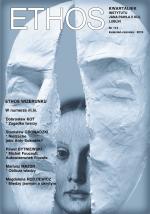Ethos w filozofii helleńskiej
Ethos in the Hellenic Philosophy
Author(s): Marian WesołySubject(s): Philosophy, Philosophical Traditions, Special Branches of Philosophy, Philosophy of Religion
Published by: Katolicki Uniwersytet Lubelski Jana Pawła II - Instytut Jana Pawła II, Wydział Filozofii
Keywords: ēthos; ěthos; philosophical way of life; Greek and Greek Roman philosophy
Summary/Abstract: The article comprises fi ve thematic parts: (1) a peculiar confl uence (ēthos through ěthos); (2) a new research perspective (ancient philosophy as a way of life); (3) a concise insight in ancient philosophy; (4) the philosophical way of life; (5) the analogy of medicine. In ancient Greece culture the concept of ‘ethos’ not only provided the basis of the name ‘ethics,’ but was also a research object in rhetoric, poetry, and music. In general, the ethoses in ancient Greek philosophy concerned character types manifested in various human actions and attitudes. Following the new research perspective proposed in the paper, the so-called philosophical way of life is considered as most characteristic of ancient Greeks and Romans. The paper aims at a description of the significant differences in the Hellenic as well as Greek Roman approach to the philosophical way of life and it refers to selected source texts. The author refutes the belief that reflection, disquisition, and argumentation were not signifi cant component parts of the way of life advanced in the Pre-Socratic and classical Greek philosophy, focused on knowledge and truth. The thesis, widely accepted today, which holds that ancient philosophy was actually a spiritual exercise preparing the subject for wisdom is true about the Greek Roman period, or Late Antiquity.
Journal: Ethos. Kwartalnik Instytutu Jana Pawła II KUL
- Issue Year: 29/2016
- Issue No: 2
- Page Range: 83-103
- Page Count: 21
- Language: Polish
- Content File-PDF

